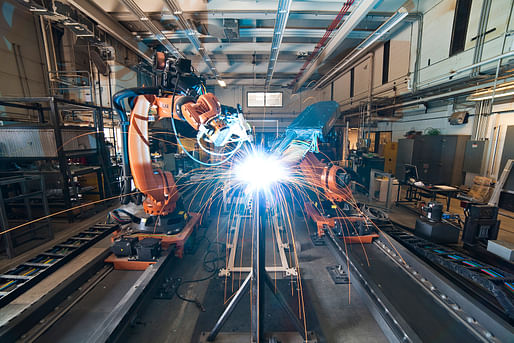

This post is brought to you by Taubman College of Architecture and Urban Planning & written by Eric Gallippo
The University of Michigan's Taubman College of Architecture and Urban Planning is offering a new post-professional degree focused on cutting-edge research in advanced fabrication techniques, digital design, and material systems.
The Master of Science in Architecture concentration of Digital and Material Technologies (MS_DMT) brings together Taubman's current Master of Science concentrations in Digital Technologies and Material Systems under one single program.
This new concentration comes as a natural progression for the two tracks, said Catie Newell, Director of the MS in Digital Technologies and Material Systems and Associate Professor of Architecture at Taubman. It also celebrates the long-coming emergence of the two areas of study as their own sector within the field.
"A lot of the work done by the students and the faculty within Taubman, as well as creative practices and academics that these efforts have affinities with, can often be easily discussed in both territories," Newell said. "Within our program, the two concentrations are already working quite fluidly."
Taubman's MS in Digital Technologies was introduced five years ago in response to an increased emphasis on digital fabrication and computation in the field of architecture. The idea was to offer students more research-driven courses that also took advantage of Taubman's own unique resources, including its state of the art Digital Fabrication Lab (FABLab) and faculty expertise.
More concentrations were soon added, including Material Systems, which emphasized the attributes and behaviors of different build materials and environmental conditions, including so-called smart materials that can sense and react to different stimuli, such as temperature or humidity.
"It became pretty clear that you can't talk about digital fabrication and computation now without also talking about the materials and their behaviors," Newell said. "It was starting to become this super concentration. The idea was to combine them to allow the different seminars and studios taught in combination to help students pick what they want to focus on."
Current MS_DT candidate Fatima Alzaabi used Taubman's FABLab to work on robot-aided plastic extrusion methodologies and metal rod bending techniques as part of her Material Engagement course. She said working with the lab's six-axes robot for the first time was a memorable experience.
"I enrolled in the MS_DT because of the opportunity it offers to explore different design methodologies and to explore different advanced manufacturing techniques and also because of the hands-on experience it offers, as well as the facilities available at the school to support this exploration," Alzaabi said.
Over the course of the intensive, 10-month program, MS_DMT students will work with various software, machines, and materials, but they'll also get a heavy dose of research, history, and the theory behind the work they're doing.
"The core of our program is teaching students how to develop this as a research practice," Newell said. "We may focus on a certain material or a certain machine, but the larger premise is, 'How do we even work this way? What does it mean to design out by knowing an aspect of a material or being committed to this type of process?"
As more schools, industries, and builders adopt these practices, they become less novel and have more potential to disrupt long-standing practices for design and construction.
"What we're doing is actually trying to change the way things are made, all based on new construction techniques, new machinery that's becoming more accessible, and new materials," Newell said.
Candidates will work in small collaborative teams with faculty at Taubman College and across campus in departments such as Material Science, Engineering, Computer Science, Interaction, Art & Design, and the Center for Sustainable Systems.
Beyond the university, collaborations with industry partners, including Kerkstra Precast and a recent grant from General Motors, will provide students with more hands-on experience with real-world projects.
The MS_DMT degree requires 36 credit hours. Coursework includes an initial skills "bootcamp" to get students up to speed on software and machinery, as well as Theories in Digital Technologies, Robotic Engagement, Virtual Engagement, Material Engagement, Systems Engagement and culminates in a Capstone project.
For more information on the program, including application and enrollment deadlines, visit https://taubmancollege.umich.edu/architecture/degrees/master-science/digital-technologies.
No Comments
Block this user
Are you sure you want to block this user and hide all related comments throughout the site?
Archinect
This is your first comment on Archinect. Your comment will be visible once approved.